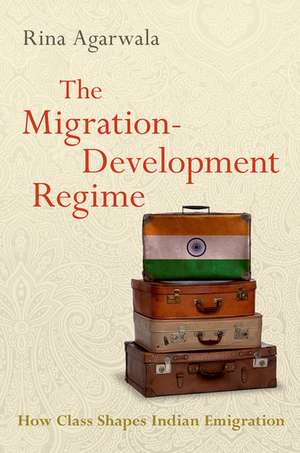The Migration-Development Regime: How Class Shapes Indian Emigration: MODERN SOUTH ASIA SERIES
Autor Rina Agarwalaen Limba Engleză Paperback – 16 dec 2022
Preț: 163.52 lei
Preț vechi: 177.28 lei
-8% Nou
Puncte Express: 245
Preț estimativ în valută:
31.29€ • 32.49$ • 26.09£
31.29€ • 32.49$ • 26.09£
Carte disponibilă
Livrare economică 21-27 februarie
Preluare comenzi: 021 569.72.76
Specificații
ISBN-13: 9780197586402
ISBN-10: 0197586406
Pagini: 288
Dimensiuni: 232 x 157 x 20 mm
Greutate: 0.38 kg
Editura: Oxford University Press
Colecția OUP USA
Seria MODERN SOUTH ASIA SERIES
Locul publicării:New York, United States
ISBN-10: 0197586406
Pagini: 288
Dimensiuni: 232 x 157 x 20 mm
Greutate: 0.38 kg
Editura: Oxford University Press
Colecția OUP USA
Seria MODERN SOUTH ASIA SERIES
Locul publicării:New York, United States
Recenzii
This beautifully written, lucidly argued book is distinguished by two unusual analytic moves. Agarwala is among the few scholars to explore the historical dynamics of migration from the perspective of a sending state rather than that of destination countries. In addition, she relentlessly excavates class differences, comparing the trajectories of elite and poor Indian emigrants and the contrasting policies shaping their divergent experiences. A provocative and essential contribution.
The subject of Indian emigration needed a great book and this is it. Agarwala gives us a meticulous history of Indian emigration and a novel framework for understanding the role the state plays in shaping emigration. In doing so she not only shows how class differences have been at the heart of all India's emigration regimes, but also reveals the dynamic link between emigration, political legitimacy and global economic transformations. The Migration-Development Regime is bold, beautifully argued and guaranteed to change how we think of migration and development.
Rina Agarwala provides a compelling sociological insight into how the India 'migration state' reproduces, if not amplifies, class inequalities. The book highlights how sending states' emigration practices are a complex amalgam of global and domestic forces, and their unintended consequences.
Master ethnographer Rina Agarwala has done it again. The Migration-Development Regime tells, as only Agarwala can do, the much-needed but woefully overlooked story of how class matters in the complex relations between a migrant-sending country and its emigrants.
For more than a century, India has sent migrants abroad to work; today, remittances from overseas workers make up one of the country's largest sources of foreign exchange. Yet, as Rina Agarwala points out in her remarkable new work, discussions of India's economic growth rarely acknowledge migrants' contributions, nor do they explore the way national and state policies continue to shape migrants' options, from Silicon Valley's highly-educated computer scientists, to construction workers packed into migrant hostels in the Middle East. Agarwala's carefully-researched, insightful analysis will change the way we think about India's diaspora, provoke new questions about how sending countries could protect workers abroad, and ensure their communities benefit from the 'development' that the migrants are supporting.
The subject of Indian emigration needed a great book and this is it. Agarwala gives us a meticulous history of Indian emigration and a novel framework for understanding the role the state plays in shaping emigration. In doing so she not only shows how class differences have been at the heart of all India's emigration regimes, but also reveals the dynamic link between emigration, political legitimacy and global economic transformations. The Migration-Development Regime is bold, beautifully argued and guaranteed to change how we think of migration and development.
Rina Agarwala provides a compelling sociological insight into how the India 'migration state' reproduces, if not amplifies, class inequalities. The book highlights how sending states' emigration practices are a complex amalgam of global and domestic forces, and their unintended consequences.
Master ethnographer Rina Agarwala has done it again. The Migration-Development Regime tells, as only Agarwala can do, the much-needed but woefully overlooked story of how class matters in the complex relations between a migrant-sending country and its emigrants.
For more than a century, India has sent migrants abroad to work; today, remittances from overseas workers make up one of the country's largest sources of foreign exchange. Yet, as Rina Agarwala points out in her remarkable new work, discussions of India's economic growth rarely acknowledge migrants' contributions, nor do they explore the way national and state policies continue to shape migrants' options, from Silicon Valley's highly-educated computer scientists, to construction workers packed into migrant hostels in the Middle East. Agarwala's carefully-researched, insightful analysis will change the way we think about India's diaspora, provoke new questions about how sending countries could protect workers abroad, and ensure their communities benefit from the 'development' that the migrants are supporting.
Notă biografică
Rina Agarwala is Associate Professor of Sociology at Johns Hopkins University. Agarwala is the award-winning author of Informal Labor, Formal Politics and Dignified Discontent in India (2013) and coeditor of Whatever Happened to Class? Reflections from South Asia (2016).





